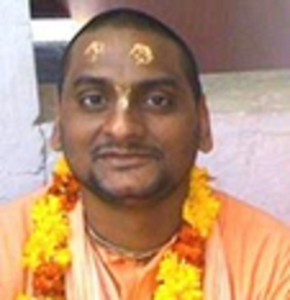 Dr. Bhakti Niskama Shanta: Missing Persons: Has Science Taken the Wrong Turn?
Dr. Bhakti Niskama Shanta: Missing Persons: Has Science Taken the Wrong Turn?
The tremendous accomplishment of mechanistic thinking have created a false conviction among scientists that the only types of causation pertinent to the scientific venture Aristotle’s material and efficient causes. Thus, modern civilisation tends to be about mechanical machines, not persons, and such a mindset irrationally excludes from the scientific domain not only the human mind (formal cause) and meaning (final cause), but also all manifestations of intelligence in non-human living entities. Throughout the history of modern science, biologists have continually been trying to squeeze living organisms into the mechanistic clockwork image of the world. Influenced by Darwinism (which insists that life is the product of natural selection) scientists believe that all psychological behaviours (including mind) are reducible to natural processes and physical laws. Therefore, for Darwinists psychological behaviours are a mere result of evolutionary survival. Darwinism produced a general consensus among the scientists for an extreme reductionistic view that in a future based on gene analysis science can understand and control all the functions of living entities including psychological behaviour. However, to date, like biologists, psychologists also do not know for sure which particular features of behaviour are an outcome of either inherited (by genes and other biological factors) or acquired (by learning) characteristics. This is well known as “Nature versus Nurture” debate within psychology. Before the advent of modern science people could easily understand the distinction between living (animate) objects and non-living (inanimate) objects through a simple observation of their movements. This plain wisdom that people had in past now being confirmed in modern science where scientists are realising that the responses of living organisms in different experimental situations are not a mere movement but are driven by goals.[1] Cell biology further revolutionised the way 20th century scientists were seeing the living organisms and 21st century science boldly accepts that “bacteria (without brain organ) are small but not stupid”.[2] Therefore, 21st century biology views life forms as self-modifying beings.[3]
Modern science may doubt the very existence of any notion of self (because there is no way modern science can explain the self by mechanistic thinking) but the notion of “I” (self) is experienced by all scientists. Unlike mechanistic thinking in physical sciences, the study of life (biology) cannot avoid self-involvement and self is the object of a subjective reflexivity. Thus, understanding of life requires an inner folding, and through this inner folding an individual continues not only a connection with his/her ‘self’, but also relates to the other individual self. In Bhagavat Vedānta the personalistic conception of the self is seen as the deeper reality of the ego, as that which brings about every relation to the external world. In material concept of life, the relationship between the individual and the self to which it relates remains external. The true ‘self’ in Bhagavat Vedānta is based on the concept of dynamic organic whole, where every individual member in the whole is meant to satisfy the center of that organic whole – primeval personal Absolute. The speaker will discuss some of the mistakes that modern science has made in ignoring the personalistic concept of reality and thus will present an overarching conception of self from Bhagavat Vedāntic philosophy as an alternative vision of reality.
[1] Sommerhoff, G. (1974) Logic of the living brain. London/New York: Wiley & Sons.
[2] Shapiro, J.A. (2007) Bacteria are small but not stupid: cognition, natural genetic engineering and socio-bacteriology. Stud Hist Phil Biol Biomed Sci, Vol. 38, 807-819.
[3] Shapiro J.A. (2011) Evolution: A view from the 21st century. Upper Saddle River, NJ: FT Press.
